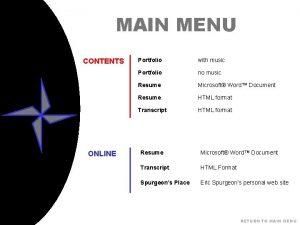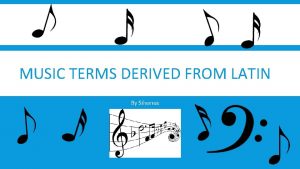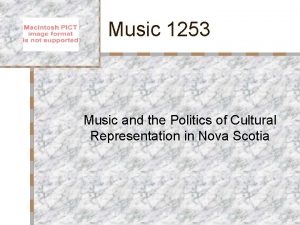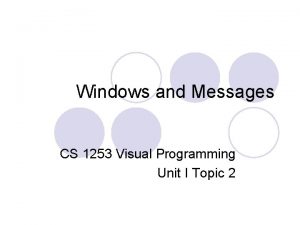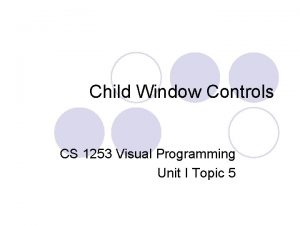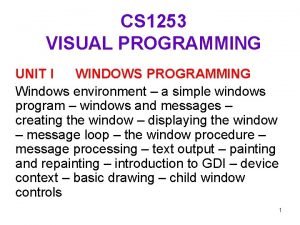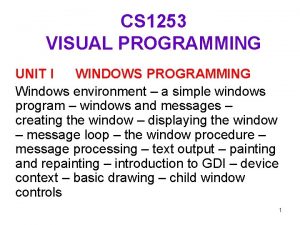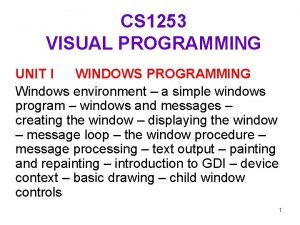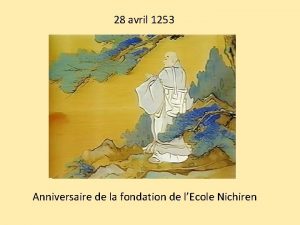Music 1253 Music and Society Terms for Discussion






















- Slides: 22

Music 1253 Music and Society Terms for Discussion

Syncretic • Syncretism involves the fusing of different beliefs, ideas, systems of thought, or cultural attributes • The result is a new idea or system that retains aspects of the contributing elements, but represents something new

Deterritorialization • Deterritorialization of cultural products involves the dilution of culturally-specific attributes to create a more generic product with universal appeal • Examples of this include “new age” recordings of South American pipes, the Irish pop band “The Corrs, ” and Canadian music acts such as Bryan Adams, Shania Twain, and k. d. lang.

Slendro and Pelog • Slendro and Pelog are scale systems (laras) used in Indonesian Gamelan music • Slendro is a 5 -note (or pentatonic) scale • Pelog is a 7 -note scale • Each Gamelan orchestra is tuned to one of these scales • Also, each Gamelan orchestra has a unique version of one of these scales

Reterritorialization • Reterritorialization involves the marketing of a cultural product’s specific ethnic origin. • Unique sounds, accents, culturally-specific images, and exotic histories are emphasized to create tokens which suggest a sense of foreigness and exoticism

Groove • Groove is a complex phenomenon that involves the acoustical repeating of a rhythmic idea that forms the metrical underpinning for a piece of groove music • Also a social phenomenon whereby people react as individuals but in synchrony with the beats of the groove

Musicking • A term coined by Christopher Small • Suggests that music is not a thing but an act • All parts of music: listening, performing, composing, dancing, teaching, air-guitar playing etc. considered musicking • Musical actors and participants called “musickers”

Emic and Etic • These terms refer to perspectives or positions from which data is gathered about a culture or group • Emic accounts are culturally-specific, using terms and ideas from within the culture itself - an inside perspective • Etic accounts are more culturally neutral, using terms and ideas that can be objectively applied to any culture or group - an outside perspective

Tala and Tal • These terms refer to the system of time-keeping in Indian Classical music • Tala is the South Indian term • Tal is the North Indian term • Roughly equivalent to metre in the Western system • Consist of a number of divisible beats (could be any number - 8, 11, 15) • Indian musicians use vocables (bols) to learn rhythmic groupings of the tala - like a rhytmic solfege • Indian audiences can oftn be seen “keeping tala” using hand gestures

The Folk • This concept developed as a byproduct of nineteenth-century European Romantic nationalism wherein the social elite sought the cultural “artifacts” of a preindustrial, undiluted society from a “Golden Age” of social cohesion, untainted by the racial diversity and class complexity of modern, urban society. • Mythical “pure” group that is a source of “authentic” culture - does not really exist

Raga and Rag • The pitch equivalent to Tala and Tal • Indian scale systems • Comprised of at least 5 notes from which a composition or improvisation develops • Ragas are often prescribed for certain seasons or times of the day • Not just a set of notes, but a way of playing those notes

Ethnomusicology/ist • A branch of musicology that deals with music and people or culture • Less concerned with the music itself (though this is changing) and more concerned with the why and how of musical production in a social context • Ethnomusicologists often conduct fieldwork similar to anthropologists whereby they study a musical culture (often by participating) from within

Cultural Imperialism • The imposition of a cultural package against the informed will of the recipients • Dominant cultures “invade” weaker cultures with their cultural products, thereby replacing or permanently altering the recipient culture • Overly simplistic concept - accepts the idea that people are passive consumers of culture, not active shapers of it

Ethnography • A complete descriptive study of a culture or group, resulting from fieldwork • Ethnographies detail the relationships among social systems and ideas within a group with the belief that no system acts in isolation • Recently scolars have made use of “virtual ethnographies” by studying internet group sites, fanzines, blogs, email lists, and chat groups

Globalization • The integration of local or regional phenomena into a unified, global whole • This can involve culture, economies, political systems, religious ideas etc. • Often dictated by the power of transnational corporations that drive the flow of goods and services around the globe

Maqam • Scale system used in Arabic music • Basic maqamat are similar to Western modes but are always ornamented and altered • Each maqam (scale) has its own rules governing the use of microtones, ornamental pitches, trichord and tetrachord subdivisions, and overall mood • Over 120 maqamat

World Music • An umbrella term often used to describe all non-Western musics as well as ethnicallyderived or traditional Western musics • Typically does not refer to popular or Western classical genres though fusions are prevalent • Term is more useful to music industry and tourism than in music scholarship

Ring Shout • Ritual practiced by African slaves in America and the Carribean • Involves moving in a circle, stomping, and clapping while chanting or singing • A Christian ritual • Thought to be the precursor to Africanbased genres of music including jazz, rock, rhythm and blues etc.

Acculturation • Process whereby different cultures come into contact and adapt their cultural attributes • Similar notion to that of Cultural Imperialism except that it allows for active shapers of culture to adapt and evolve from contact with foreign sources, rather than simply having culture imposed on them

Glocalization • The attempt to retain local identity in the face of the overwhelming forces of globalization • This term can also be used to to describe the creation of local products that are marketed globally

Global Village • Term first used by Canadian philospher Marshall Mcluhan in his 1962 book The Gutenberg Galaxy • Describes an historical period whereby mass -communication (at the time - radio and television) will eliminate individualism and move society towards a more integrated, collective identity and restore aural-based cultural communications

Gamelan • An Indonesian percussion orchestra consisting of metallophones, gongs, flutes, drums, and singers • Individuals play interlocking parts as one unified whole • Used as court music, religious music, and popular music, predominantly in Java and Bali • Also popular in the West in educational institutions
 Online music portfolio
Online music portfolio Discussion of simple distillation
Discussion of simple distillation Polynomial classification
Polynomial classification What are the like terms in the algebraic expression
What are the like terms in the algebraic expression Chapter 9. voices and instrument families
Chapter 9. voices and instrument families Gertler econ
Gertler econ Grave musical term
Grave musical term Fspos vägledning för kontinuitetshantering
Fspos vägledning för kontinuitetshantering Typiska novell drag
Typiska novell drag Tack för att ni lyssnade bild
Tack för att ni lyssnade bild Vad står k.r.å.k.a.n för
Vad står k.r.å.k.a.n för Shingelfrisyren
Shingelfrisyren En lathund för arbete med kontinuitetshantering
En lathund för arbete med kontinuitetshantering Kassaregister ideell förening
Kassaregister ideell förening Tidbok för yrkesförare
Tidbok för yrkesförare A gastrica
A gastrica Densitet vatten
Densitet vatten Datorkunskap för nybörjare
Datorkunskap för nybörjare Stig kerman
Stig kerman Debattartikel struktur
Debattartikel struktur Delegerande ledarskap
Delegerande ledarskap Nyckelkompetenser för livslångt lärande
Nyckelkompetenser för livslångt lärande Påbyggnader för flakfordon
Påbyggnader för flakfordon
